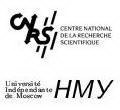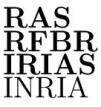
|

|
Conference "Global Fields"October 25 - 28, 2011Moscow, Russia |

|

|

|

|
Conference "Global Fields"October 25 - 28, 2011Moscow, Russia |

|

|
Organisers: Philippe Lebacque (Laboratoire de Mathématiques de Besançon ), Michael Tsfasman (CNRS, Laboratoire Poncelet, Institute for Information Transmission Problems), Alexey Zykin (Laboratoire Poncelet, State University Higher School of Economics, IITP)
The French-Russian Poncelet Laboratory organizes a conference on "Global fields", October 25-28, 2011, to take place at the Independent University of Moscow.
The study of global fields and varieties over them has been a central theme of research for more than a century. It involves many research areas such as analytic number theory, algebraic number theory, arithmetic geometry or algebraic geometry, and it has got many applications to very concrete problems, for example to problems coming from information theory (coding theory and cryptography).
Some of the most important problems on this topic concern the understanding of meromorphic functions (zeta/L-functions) that are built from arithmetic objects such as global fields and elliptic curves over global fields. For instance, the famous Riemann hypothesis predicts that all the non trivial zeroes of zeta functions of global fields lie on the critical line Re s = 1/2. This hypothesis has been proven for varieties over finite fields using very deep geometric methods, yielding an immense number of applications both for the problems over number fields and function fields. Another example is the Birch and Swinnerton-Dyer conjecture that predicts that the analytic behaviour of the L-function of an elliptic curve over a global field is related to arithmetic information on the curve: the size of the set of rational points, the obstruction to local-global principle etc. Thus global fields join together many beautiful mathematical domains. The theory of global fields also has important applications, for example to coding theory: one can construct very good error correcting codes using the arithmetic properties of function fields and number fields.
The aim of this seminar is to bring together mathematicians from different research areas related to global fields or varieties over them. The leading experts in their domains will be invited to talk about the most recent advances. We hope that the seminar will develop new or closer interactions between scientists from different parts of mathematics connected by the study of global fields and their applications.